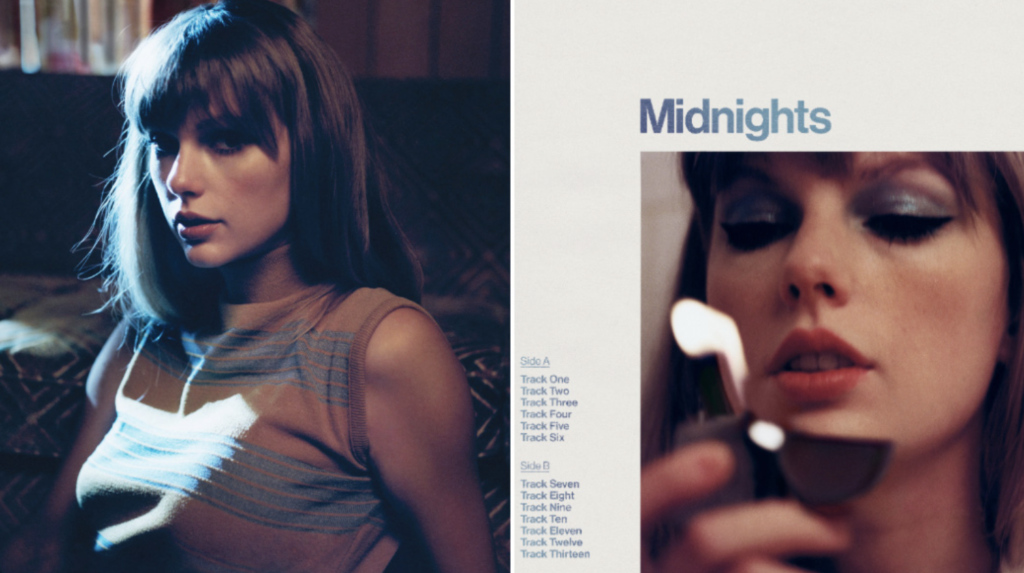Following what many call her “Folklore” era, Taylor Swift released a much more electrifying and slightly controversial 10th album, “Midnights,” at midnight on Oct. 21. That same day, Spotify announced that the 11-time Grammy winner had broken the record for the biggest album streaming debut in a single day.
When Swift first announced “Midnights” on Aug. 28 at the 2022 Video Music Awards, she described the album as consisting of “the stories of 13 sleepless nights scattered throughout my life.” “Midnights” is a sleek, synth-pop album produced by Swift’s longtime friend and frequent collaborator Jack Antonoff, and it marks her “return to pop music.”
With the melancholic concept album of “late night,” even the loudest tracks are subdued with murky electronic grooves. Swift unpacks her past and current romances, deepest doubts, personal battles and grants advice to listeners. It’s best-enjoyed when driving home late at night, creating the perfect mood for self-reflection.
In the witching hour after “Midnights’” release, Swift demonstrated her love for her “cat and mouse” release games, as she dropped seven more songs at 3 a.m, which she calls “Midnights (3 a.m. Edition)”.
In total, Swift released 20 new songs, in which the themes of “Midnights” are perfectly encapsulated throughout the soundtrack.
While Swift’s vocals are her strongest to date on the album, her recent albums — “folklore,” “evermore,” and “Red (Taylor’s Version” — contain some of her best lyrics, giving “Midnights” a tough act to follow. “Midnights’” lyrics are almost conversational, as if she is spilling some of her most conflicted and personal moments late at night.
Opener “Lavender Haze” is an airy, upbeat, electronic-infused track that mirrors her style of the song “False God” from her “Lover” album.
While some fans who call themselves “Gaylors” interpret the song as a coming-out track, in an Instagram post, Swift explained to fans that “Lavender Haze” is a phrase she came across watching the show “Mad Men,” which is set in the 1950s. The phrase was used in the ‘50s to describe being in love.
The lyrics reveal Swift’s struggles trying to fall in love while constantly being under the gaze of sometimes misogynistic public opinion, singing “The only kind of girl they see / Is a one-night or a wife.” With a dance-inducing, thumping effect, “Lavender Haze” is the perfect way to introduce the intense experience “Midnights” provides.
Color is a recurring motif throughout Swift’s music, and “Midnights” is no exception. In contrast to her 2012 song “Red,” “Maroon” is a slower, more mature sequel, painting love as the color of deep red, or the “rust that grew between telephones.”
Some of our favorite tracks that round out the album’s glinted soundscape are “Question…?” and “Bejeweled.” “Question…?” sampled Swift’s 2014 “1989’s” single “Out of the Woods,” as she reflects the “what-ifs” of her past relationships in a bouncy chorus.
“Bejeweled” is a fresh, crystalline pop-song standout, reminiscent of her song “Gorgeous.” Though many of our friends saw it as “too Disney” or “weak” for their taste, putting it at the bottom of their rankings, we found the poppier Disney swell right up our alley, following the overall message of warning a guy that she has the capacity to light up rooms if he doesn’t pay more attention.
“Midnights” surely contains some of Swift’s most profound and even slightly questionable lyrics. Highly anticipated lead single “Anti-Hero” is an example of this, as she sings, “Sometimes I feel like everybody is a sexy baby/ And I’m a monster on the hill.” In the chorus, she sings “Hi, it’s me. I’m the problem, it’s me,” shedding light to realizing that it’s OK to admit that one may be in the wrong and have things they need to work through.
One of the tracks that fell the most short on the album for us, was “Vigilante Sh*t.” The lyrics and opening line “Draw the cat eye sharp enough to kill a man,” comes off as overly aggressive and lacking depth, almost like an attempted copy of Billie Eilish’s “Bad Guy.”
“Midnights” marks a solid return to the pop genre for Swift. Because it’s a “late night” album, “Midnights” may not come across as a universal album that can be listened to at any time of day. Parts of it are edgy and ignite feelings of burning revenge like “reputation,” while other songs are more dreamy and reflect “Lover,” or “1989.”
Though the subtle melodies of “Midnights” may take time to appreciate, the album is almost like a quiet shade of magic, and bound to grow on listeners with repeated listens.
There’s more than one edge to “Midnights.” It can be a space to revel and disconnect with its dreamy flow, or it can be haunting, revelatory and doomful, as fragments of reality seeps in with each ticking second.


























